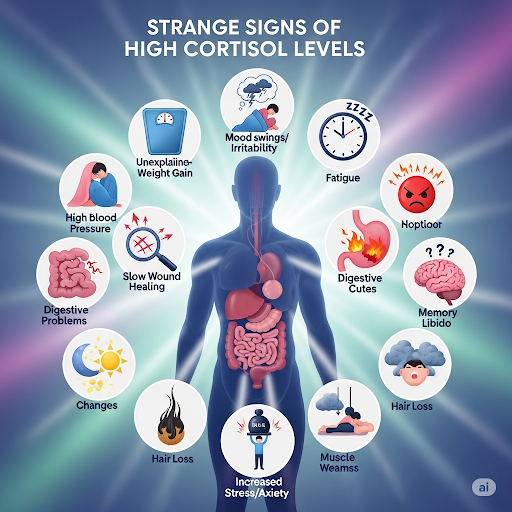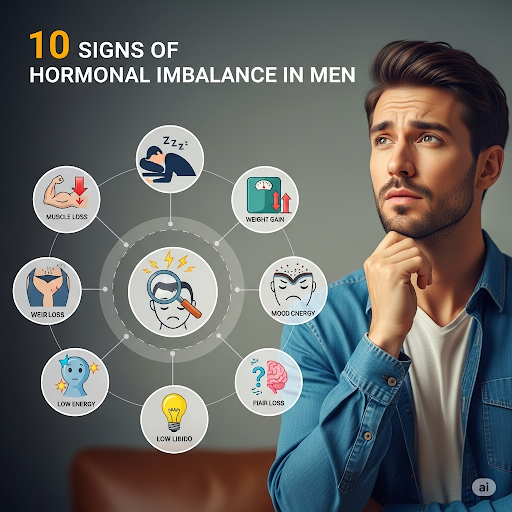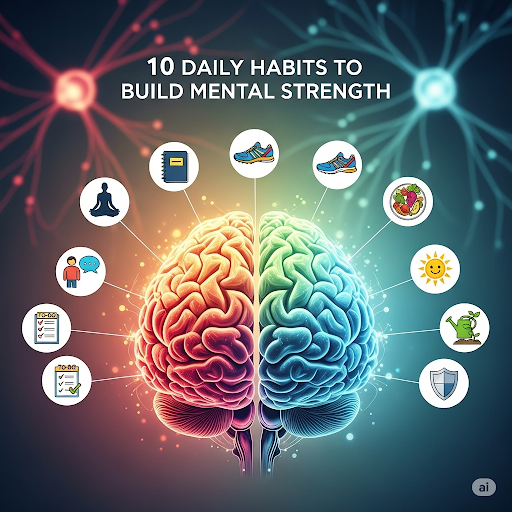Is Stress Silently Hijacking Your Body?
Introduction: When Stress Goes from Helpful to Harmful
Cortisol is one of those hormones we rarely think about unless we’re deep into a health crisis or a late-night Google rabbit hole. But whether you realize it or not, cortisol is running the show behind the scenes of your daily life. It’s your body’s main stress hormone released by the adrenal glands whenever you’re in a pinch. In small, occasional doses, it’s helpful. It keeps you alert, focused, and ready to tackle life’s curveballs.
But here’s the kicker: when cortisol stays high for too long, it can silently throw everything out of whack from your sleep to your skin, your weight to your mood. Chronic stress isn’t just a mental burden; it’s a full-body sabotage, and cortisol is often the main culprit. The real problem? Many signs of high cortisol are so subtle or weird that people don’t even realize what’s happening.
So let’s unpack some of the stranger, sneakier signs that your cortisol levels might be running way too high and wreaking quiet havoc on your health.
You’re Gaining Weight, Especially Around the Belly Even Without Overeating
You haven’t changed your diet much, you’re moving your body, and yet your jeans are tighter, especially around the midsection. What gives? High cortisol can trigger fat storage around the abdomen, even if you’re not overeating. This happens because cortisol increases blood sugar levels and insulin, leading your body to stash away fat “just in case.” This kind of belly fat is especially stubborn and metabolically active, meaning it can actually increase inflammation in the body. If your muffin top arrived uninvited and won’t leave, cortisol might be the landlord.
Sleep Feels Like a Battle Instead of a Blessing
If you find yourself tossing and turning at night, waking up at 3 a.m. wired, or feeling like your brain is on a hamster wheel, cortisol could be the reason. This hormone is supposed to drop at night so melatonin can take over and help you sleep. But when cortisol is elevated late into the evening thanks to work stress, screens, or unresolved anxiety your body stays in “alert” mode. You’re exhausted, but your brain doesn’t get the memo. Chronic insomnia is one of the earliest signs of cortisol imbalance.
You’re Getting Sick More Often, and It Takes Forever to Recover
Cortisol has a complicated relationship with your immune system. In short bursts, it suppresses inflammation and can be helpful. But when it’s chronically elevated, it weakens your immune defenses. You might catch colds more often, feel like you’re always fighting something, or struggle to recover from even minor illnesses. If your immune system feels like it’s always lagging behind, stress may be to blame.
Your Cravings Are Out of Control Especially for Salt, Sugar, or Fat
Ever feel like you could inhale a whole bag of chips or an entire chocolate cake without blinking? That’s not just a lack of willpower it’s a physiological response. High cortisol levels make you crave comfort foods, especially those that are salty, sugary, or fatty. These foods temporarily dampen the stress response, making your body feel “safe” again. Unfortunately, this also contributes to weight gain, blood sugar spikes, and more cortisol. It’s a vicious (and delicious) cycle.
Your Libido Is Practically Nonexistent
When cortisol is high, your body goes into survival mode. And guess what takes a backseat when your body thinks it’s under threat? Reproduction. High cortisol suppresses sex hormones like estrogen and testosterone, leading to a sharp dip in libido. If your sex drive has left the building without explanation, it might not be about attraction or connection it might just be your hormones waving a red flag.
Your Skin Is Breaking Out Like a Teenager Again
Stress hormones like cortisol don’t just mess with your mood they show up on your face. High cortisol can increase oil production in your skin, leading to clogged pores and sudden breakouts. Adult acne, particularly around the jawline or chin, is a common and overlooked sign of hormonal imbalance. If your skin is acting up out of nowhere, and you’re past your teenage years, your stress levels might be the hidden villain.
You Feel Constantly Wired… but Weirdly Tired Too
One of the most confusing symptoms of high cortisol is that jittery-exhausted feeling where you’re anxious and overstimulated but somehow also dragging through the day. It’s like your body is stuck in “go mode,” but your battery is dying at the same time. This paradox happens because cortisol initially gives you energy, but over time, it drains your adrenal glands and wears out your nervous system. The result? Burnout with a side of anxiety.
You’re Losing Hair or It’s Thinning Rapidly
Stress shedding is real. Elevated cortisol levels can disrupt the normal hair growth cycle and push follicles into a “resting” phase, leading to hair loss. If you’re seeing more hair in your brush, shower drain, or on your pillow, and there’s no clear reason like illness or diet change, cortisol could be interfering with your hair’s natural rhythm. It’s not just vanity your hair can be an early warning signal.
You’re Forgetting Things or Struggling to Concentrate
That foggy feeling in your brain the one where you read the same sentence three times or walk into a room and forget why could be more than just distraction. Chronically high cortisol impairs the hippocampus, the part of the brain responsible for memory and learning. Over time, it can affect your ability to focus, retain information, and think clearly. If your brain feels like it’s buffering all the time, it might be soaked in stress hormones.
You Have Weird Digestive Issues That Don’t Seem to Add Up
Ever notice how stress goes straight to your stomach? High cortisol can alter your gut microbiome, slow down digestion, and make you more sensitive to bloating, cramps, or constipation. It can also increase gut permeability (a.k.a. “leaky gut”), allowing unwanted particles to sneak into your bloodstream and trigger inflammation. If your digestion has been unpredictable or just plain weird lately, stress could be the silent saboteur.
You’re Sweating More Than Usual Even When It’s Not Hot
Cortisol ramps up your sympathetic nervous system the “fight or flight” side which can trigger excess sweating, especially from your hands, feet, or underarms. This kind of sweating isn’t about heat; it’s about nervous system overdrive. If you’re noticing clammy hands or random sweating during calm moments, your stress response may be stuck in the “on” position.
Your Blood Pressure or Blood Sugar Is Quietly Climbing
Cortisol directly affects both blood sugar and blood pressure regulation. If you’ve recently been told you’re pre-diabetic, insulin resistant, or your BP is “borderline high” despite a decent lifestyle, cortisol could be the hidden cause. It raises glucose levels to give you energy to “fight or flee,” and constricts blood vessels to keep blood pumping fast. Over time, these effects can wear down your system and lead to metabolic problems quietly and gradually.
Final Takeaway: Your Body Whispers Before It Screams
The sneakiest thing about high cortisol is that it rarely announces itself directly. It speaks in strange symptoms, odd patterns, and gradual imbalances. You might feel tired, anxious, bloated, foggy, or suddenly puffy in the middle without ever connecting the dots. But once you understand what cortisol does and how it operates, those strange signs make a lot more sense.
The good news? Cortisol is not your enemy. It’s just trying to help you survive. The key is to bring it back into balance not by fighting it, but by nurturing your nervous system. That means more sleep, less doomscrolling, blood sugar balance, magnesium-rich foods, sunlight, breathwork, laughter, and yes, saying no sometimes. Your body doesn’t want to stay in survival mode it just needs permission to relax.












